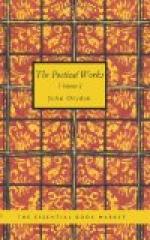Why are my thoughts upon a crown
employ’d.
Which, once obtain’d, can be but
half enjoy’d?
Not so when virtue did my arms require,
And to my father’s wars I flew entire.
My regal power how will my foes resent,
When I myself have scarce my own consent!
130
Give me a son’s unblemish’d
truth again,
Or quench the sparks of duty that remain.
How slight to force a throne that legions
guard
The task to me! to prove unjust, how hard!
And if the imagined guilt thus wound my
thought,
What will it when the tragic scene is
wrought!
Dire war must first be conjured from below,
The realm we rule we first must overthrow;
And, when the civil furies are on wing,
That blind and undistinguish’d slaughters
fling, 140
Who knows what impious chance may reach
the king?
Oh, rather let me perish in the strife,
Than have my crown the price of David’s
life!
Or if the tempest of the war he stand,
In peace, some vile officious villain’s
hand
His soul’s anointed temple may invade;
Or, press’d by clamorous crowds,
myself be made
His murderer; rebellious crowds, whose
guilt
Shall dread his vengeance till his blood
be spilt.
Which, if my filial tenderness oppose,
150
Since to the empire by their arms I rose,
Those very arms on me shall be employ’d,
A new usurper crown’d, and I destroy’d:
The same pretence of public good will
hold,
And new Achitophels be found as bold
To urge the needful change—perhaps
the old.
He said. The statesman with
a smile replies,
A smile that did his rising spleen disguise:
My thoughts presumed our labours at an
end;
And are we still with conscience to contend?
160
Whose want in kings as needful is allow’d,
As ’tis for them to find it in the
crowd.
Far in the doubtful passage you are gone,
And only can be safe by pressing on.
The crown’s true heir, a prince
severe and wise,
Has view’d your motions long with
jealous eyes,
Your person’s charms, your more
prevailing arts,
And mark’d your progress in the
people’s hearts,
Whose patience is the effect of stinted
power,
But treasures vengeance for the fatal
hour; 170
And if remote the peril he can bring,
Your present danger’s greater from
the king.
Let not a parent’s name deceive
your sense,
Nor trust the father in a jealous prince!
Your trivial faults if he could so resent,
To doom you little less than banishment,
What rage must your presumption since
inspire!
Against his orders you return from Tyre.
Nor only so, but with a pomp more high,
And open court of popularity,
180
The factious tribes.—And this
reproof from thee!
The prince replies; Oh, statesman’s
winding skill,
They first condemn that first advised
the ill!




